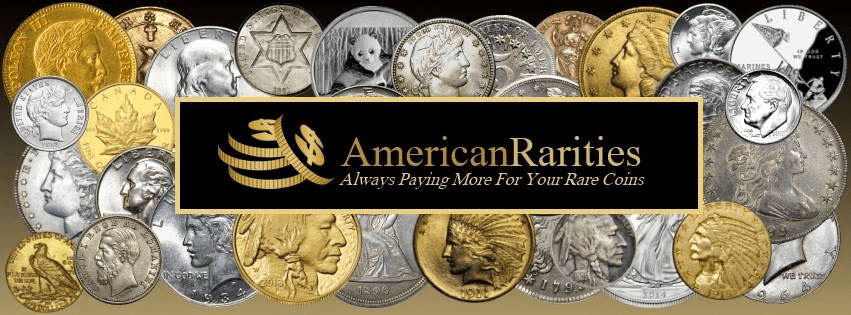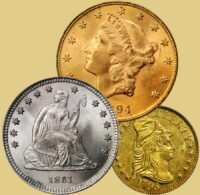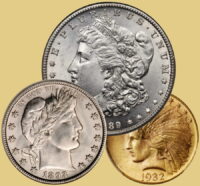Information regarding State and Federal
Coin Laws and Tax Reporting Obligations
Alabama - Georgia

Sales Tax Law:
Sales tax exemption for gold, silver, and platinum bullion in the state of Alabama.
Capital Gains Tax:
Gold and silver are subject to capital gains taxation when exchanged for Federal Reserve notes or when used in barter transactions.
Sales Tax Law:
Alaska currently does not have a sales and use tax; however, some local jurisdictions impose local sales taxes.
Capital Gains Tax:
Alaska does not impose a state income tax on its citizens, so there is no taxation on capital gains on precious metals.
Sales Tax Law:
The sale of precious metal bullion and monetized bullion to the ultimate consumer is exempt from sales taxation in the state of Arizona.
“Monetized bullion” is defined as “coins and other forms of money that are manufactured from gold, silver, or other metals and that have been or are used as a medium of exchange in this or another state, the United States or a foreign nation.”
“Precious metal bullion” is defined as “precious metal including gold, silver, platinum, rhodium, and palladium, that has been smelted or refined so that its value depends on its contents and not on its form.
Capital Gains Tax:
Gold and silver are not subject to capital gains taxation when exchanged for Federal Reserve notes or when used in barter transactions.
Sales Tax Law:
Arkansas law currently levies a sales tax on precious metals purchases in the state of Arkansas.
Capital Gains Tax:
Gold and silver are subject to capital gains taxation when exchanged for Federal Reserve notes or when used in barter transactions.
Sales Tax Law:
Article 7, Regulation 1599. California enacted a sales tax exemption in 2009 for purchases of $1,500 or more.
Capital Gains Tax:
Gold and silver are subject to capital gains taxation when exchanged for Federal Reserve notes, or when used in barter transactions.
Sales Tax Law:
Retail sales of coins and precious metal bullion are exempt from sales tax. This exemption applies to state, Regional Transportation District/Scientific and Cultural Facilities District, county and state-collected local taxes.
“Coins” is defined as “monetized bullion or other forms of money manufactured from gold, silver, platinum, palladium, or other such metals now, in the future, or heretofore designated as a medium of exchange under the laws of this state, the United States, or any foreign nation.”
“Precious metal bullion” is defined as “any precious metal, including but not limited to gold, silver, platinum, and palladium, that has been put through a process of refining and is in such a state or condition that its value depends upon its precious metal content and not its form.”
The Colorado statute continues, “not all numismatic pieces are exempt. Precious metal bullion and coins that are or were at one time used as currency or medium of exchange in the United States or a foreign country (such as quarters, dimes, nickels and pennies) are exempt. However, numismatic pieces such as paper money, tokens, checks, wampum and similar items not specifically exempt from taxation do not fall under this exemption. Transactions involving the sale of jewelry and commemoratives continue to be taxable.”
Capital Gains Tax:
Gold and silver are subject to capital gains taxation when exchanged for Federal Reserve notes or when used in barter transactions.
Sales Tax Law:
Section 12-412-45 of the Connecticut Sales and Use Taxes Chapter, “sales or and the storage or use of rare or antique coins, gold or silver bullion and gold or silver legal tender of any nation, traded according to its value as precious metal, provided such exemption shall not be applicable with respect to any such sale, storage or use in which the total value of such bullion or legal tender sold by the retailer is less than one thousand dollars.
Capital Gains Tax:
Gold and silver are subject to capital gains taxation when exchanged for Federal Reserve notes or when used in barter transactions.
Sales Tax Law:
Delaware does not impose a state or local sales tax, but does impose a gross receipts tax on the seller of goods or provider of services in the state.
Capital Gains Tax:
Gold and silver are subject to capital gains taxation when exchanged for Federal Reserve notes or when used in barter transactions.
Sales Tax Law:
Rule 12A-1.0371 of the Florida Administrative Code, “the sale of gold, silver, or platinum bullion, or any combination thereof, in a single transaction, is exempt when the total sales price of such bullion exceeds $500.”
Capital Gains Tax:
Florida does not impose a state income tax on its citizens, so there is no taxation on capital gains on precious metals.
Sales Tax Law:
§ 48-8-3 of the Georgia Code, “sales of gold, silver, or platinum bullion or any combination of such bullion” is exempt from sales taxation.
The statute continues, “sales of coins or currency or a combination of coins and currency” are also exempt from sales taxation.
Capital Gains Tax:
Gold and silver are subject to capital gains taxation when exchanged for Federal Reserve notes or when used in barter transactions.
Free Appraisal for Your Coins and Coin Collections
Email, Text, or Use This Form To Send Us Your Inventory List or Pictures
Email: staff@americanrarities.com | Phone: 800-622-5680 | Text: 720-600-4740



